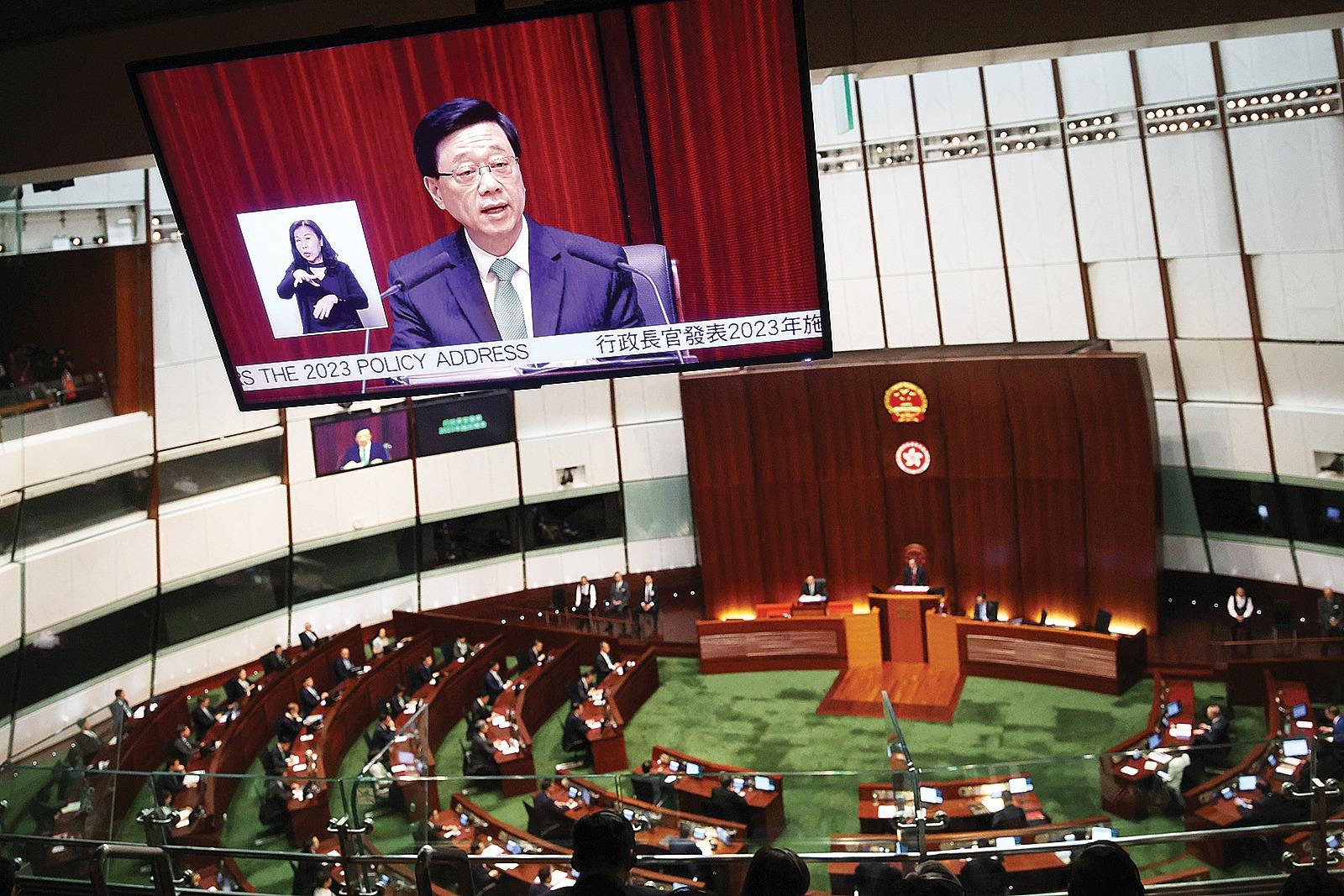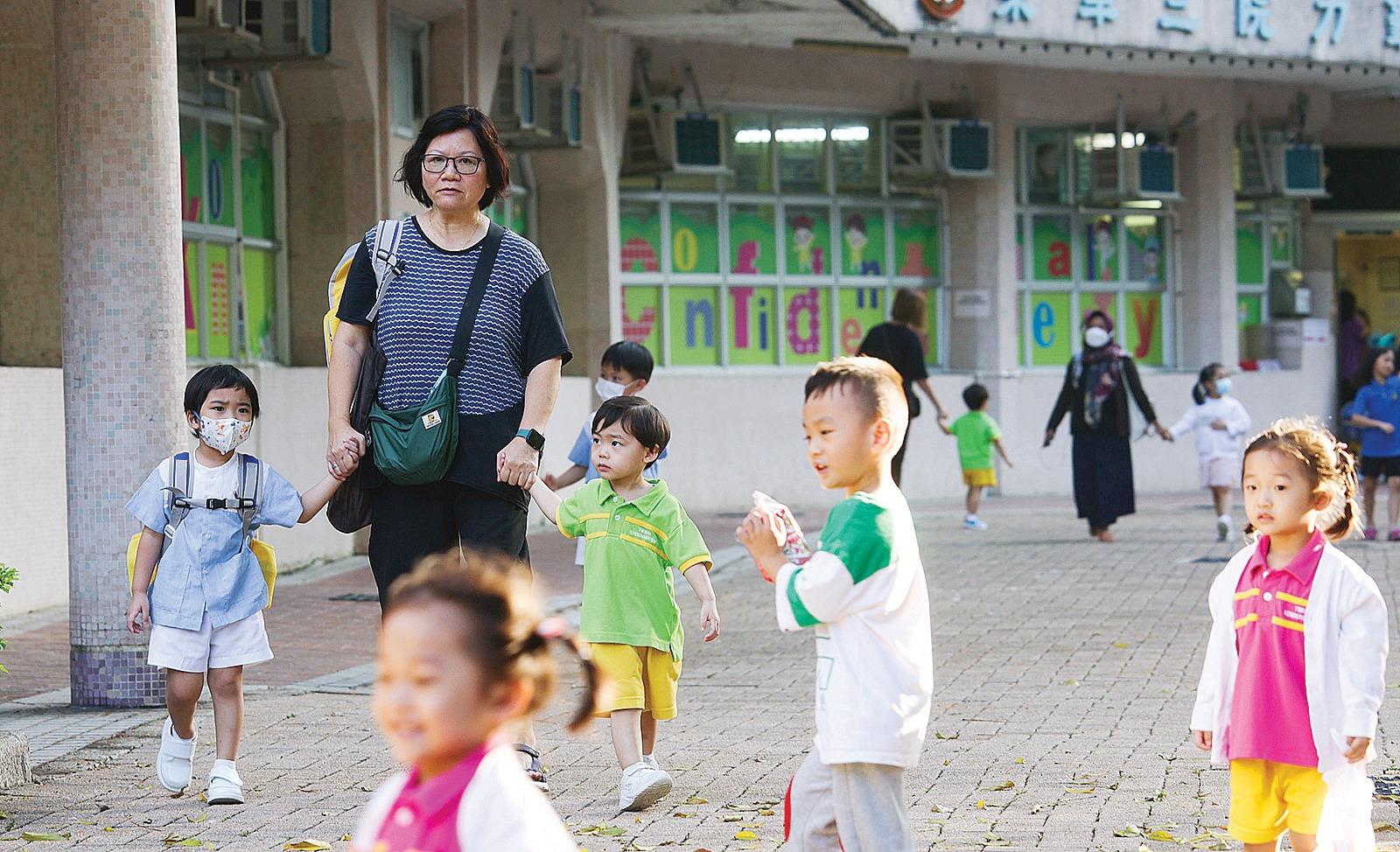 Hong Kong Chief Executive John Lee Ka-chiu delivers his 2023 Policy Address to the Legislative Council on Oct 25, 2023 morning. (ANDY CHONG / CHINA DAILY)
Hong Kong Chief Executive John Lee Ka-chiu delivers his 2023 Policy Address to the Legislative Council on Oct 25, 2023 morning. (ANDY CHONG / CHINA DAILY)
The Hong Kong Special Administrative Region seeks to address its population woes by stimulating childbirth internally and attracting outside talent, according to Chief Executive John Lee Ka-chiu’s second Policy Address, delivered on Wednesday.
The steps for attracting nonlocal talents include expanding the Top Talent Pass program; easing visa policies for people of member states of the Association of Southeast Asian Nations, as well as employment policies for nonlocal students studying in the SAR; doubling the quota for nonlocal students at publicly funded universities; and setting up an office of the Hong Kong Talent Engage to provide well-rounded support for incoming talents.
The quota for nonlocal students, which will rise from 3,000 to 6,000, aims to attract more people from the Chinese mainland and Belt and Road Initiative participating countries. The new quota may not be fully utilized initially because of limited facilities, but it will not affect local student admissions, according to a government source.
In a bid to entice professionals from BRI countries and regions, the government will introduce visa programs for Vietnamese talents seeking employment in Hong Kong and relax the application process for multiple-entry visas for Vietnamese nationals coming to the city for business and tourism.
This visa incentive targets high-end talents in business, allowing them to apply for visas for two years or more, with unrestricted entries to the SAR, and each visit limited to 14 days.
Besides Vietnam, talents from Laos and Nepal will have their employment, training and education opportunities at universities funded by the University Grants Committee extended.
From next month, full-time nonlocal research postgraduates studying in Hong Kong can seek part-time work in excess of the previous maximum limit of 20 hours per week. Over 35,000 eligible nonlocal students are expected to benefit from the two-year pilot program.
The list of eligible universities under the Top Talent Pass program will be expanded next month to include eight top-tier mainland and overseas institutions, bringing the total to 184. Among the eight new educational institutions are Wuhan University, Xi’an Jiaotong University and the Harbin Institute of Technology on the mainland.
The talent pass list will also cover graduates of the top 10 universities of the Academic Ranking of World Universities, published by Shanghai Jiao Tong University in the past five years, as well as the top five institutions in the “Hospitality and Leisure Management” category of the QS World University Rankings.
By late last month, Hong Kong had approved more than 100,000 out of 160,000 applications under different talent initiatives rolled out or updated in the past year. About 60,000 of the successful applicants have arrived in the city.
To provide support and follow-up services for incoming talent to meet their needs, the government will establish the Hong Kong Talent Engage office by the end of October.
 On Oct 25, 2023 afternoon in Tseung Kwan O, the New Territories, kindergartners are picked up by their carers. Earlier the same day, the city’s Policy Address revealed a variety of incentives to increase the birthrate, which hit a record low of about 32,500 newborns in 2022. (CALVIN NG / CHINA DAILY)
On Oct 25, 2023 afternoon in Tseung Kwan O, the New Territories, kindergartners are picked up by their carers. Earlier the same day, the city’s Policy Address revealed a variety of incentives to increase the birthrate, which hit a record low of about 32,500 newborns in 2022. (CALVIN NG / CHINA DAILY)
Boost childbearing
Internally, to encourage childbearing, the government has introduced a range of policies, including a one-off cash handout of HK$20,000 ($2,557) for parents-to-be. Priority in purchasing subsidized housing or renting public housing will be given to these parents, along with increased subsidies for raising children and additional childcare places to accommodate working parents. It is estimated that these family support policies may lead to a 20 percent annual increase in newborns within three years.
A government source said the eligibility for these policies extends to employed parents as long as one parent is a permanent resident of Hong Kong, regardless of marital status. The application process takes approximately two to three weeks.
Families with newborns will also be given priority for subsidized flats, with 10 percent of the Home Ownership Scheme’s subsidized flats allocated to them. Parents will have the opportunity to select flats through a lottery system until their children are 3 years old.
Additionally, the waiting time for public rental flats will be reduced by one year for parents of newborns, compared to an average waiting time of 5.3 years for the general public.
To support working families in childbearing, a new pilot plan offering after-school care services will be launched. Around 50 schools will provide 3,000 care services, with collaboration from suitable NGOs. This program, estimated to cost $99 million, will be free for families receiving Comprehensive Social Security Assistance or those with low incomes.
Furthermore, over the next three years starting from 2024, the after-school care program for pre-primary children will be extended. The number of participating centers will increase to 28, with the number of service places rising from 672 to 1,176.
To encourage more people to participate in the Neighbourhood Support Child Care Project, the incentive payment for carers of children aged three to nine will increase from the standard rate of HK$25 per hour to HK$40. For carers of children under three or with special learning needs, the incentive payment will be raised to HK$60 per hour. Starting from the fourth quarter of next year, the number of service places under the project will be doubled to approximately 2,000.


